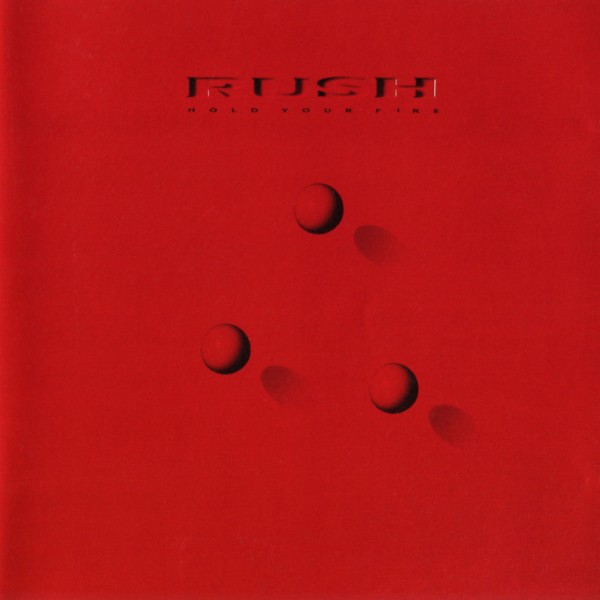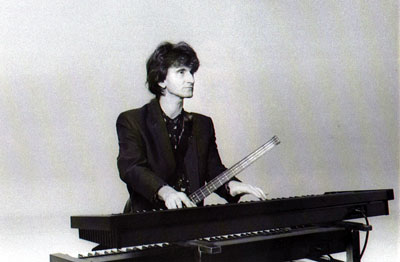
Facing the Killing Instinct
 Similar to “Caress of Steel”, 1987’s “Hold Your Fire” is another entry in the Rush catalog that hardcore Rush nerds looks on with...at best, suspicious glances and at worst vile contempt. If the past three records were flirting with and eventually diving head first into the realms of synth and new-wave, this release is just drenched in that sound, even more than “Power Windows”. This was the album that broke the audience's patience with this synth heavy direction, with “Hold Your Fire” routinely regarded as one of the very few “bad” (by Rush’s lofty standards) albums the three have released in their career.
Similar to “Caress of Steel”, 1987’s “Hold Your Fire” is another entry in the Rush catalog that hardcore Rush nerds looks on with...at best, suspicious glances and at worst vile contempt. If the past three records were flirting with and eventually diving head first into the realms of synth and new-wave, this release is just drenched in that sound, even more than “Power Windows”. This was the album that broke the audience's patience with this synth heavy direction, with “Hold Your Fire” routinely regarded as one of the very few “bad” (by Rush’s lofty standards) albums the three have released in their career. At the very least the idea that the band presented was at least , this more chilled out experience than what was presented on previous releases. There are various jazz fusion influences such as Allan Holdsworth or Chick Corea’s Return to Forever, more focused on atmosphere than direct impact or aggression. In terms of standout tracks, the big single off the record, “Time Stands Still” is a very nice exploration of that feeling when time seems to stop in a certain moment in one’s life, with a great feature (the first that the band had undertook) by singer Aimee Mann. “Lock and Key” is a fairly tense track, discussing the idea of wanting to do something greater for the sake of society, but having to keep it away, to keep it under lock and key as it were. An underrated song and definitely one that gains greater appreciation with each listen.
At the very least the idea that the band presented was at least , this more chilled out experience than what was presented on previous releases. There are various jazz fusion influences such as Allan Holdsworth or Chick Corea’s Return to Forever, more focused on atmosphere than direct impact or aggression. In terms of standout tracks, the big single off the record, “Time Stands Still” is a very nice exploration of that feeling when time seems to stop in a certain moment in one’s life, with a great feature (the first that the band had undertook) by singer Aimee Mann. “Lock and Key” is a fairly tense track, discussing the idea of wanting to do something greater for the sake of society, but having to keep it away, to keep it under lock and key as it were. An underrated song and definitely one that gains greater appreciation with each listen.
With those positives acknowledged, those two
songs don’t save “Hold Your Fire” from being Rush’s weakest album up to this point in their career. The majority of the tracks are just unmemorable, with many of them not having any teeth or energy in the slightest. While some fans may scoff at the records before “Hold Your Fire”, at the very least most can acknowledge that the records did have a bite, or a certain thematic angle.“ Signals” angle was middle-class society and emerging technology, “Grace Under Pressure” it was anxiety and war, and “Power Windows” it was social and political issues. With this album, there is no specific focus with “Hold Your Fire”. It just feels like a bunch of tracks just put together just to fulfill the required length for a full-length LP, which isn’t to say the band sold-out, not in the slightest, it’s just execution wise, the band fell flat on this release. While most of the tracks are just mediocre, there is one track that is full-blown bad: “Tai Shan”. A laborious song, with its Chinese “aesthetic”, which comes off as cheesy and like window-dressing rather than a genuine style choice. Combined with the weird placement of synths and it’s reasonable to place this track as one of if not the worst song Rush had released, and even Alex Lifeson would agree with that sentiment.
 While still a financial success, it was a considerably less successful release then their previous releases in the decade. “Hold Your Fire” was the straw that broke the camel’s back with this synthesizer direction the band was implementing and a change had to be made. As the eighties were nearing their end, Rush would unveil their last hurrah of what was their most successful and in many aspects daring decade of their career; would they learn the mistakes that they made on “Hold Your Fire”, and in 1989, Rush would give their response.
While still a financial success, it was a considerably less successful release then their previous releases in the decade. “Hold Your Fire” was the straw that broke the camel’s back with this synthesizer direction the band was implementing and a change had to be made. As the eighties were nearing their end, Rush would unveil their last hurrah of what was their most successful and in many aspects daring decade of their career; would they learn the mistakes that they made on “Hold Your Fire”, and in 1989, Rush would give their response.
songs don’t save “Hold Your Fire” from being Rush’s weakest album up to this point in their career. The majority of the tracks are just unmemorable, with many of them not having any teeth or energy in the slightest. While some fans may scoff at the records before “Hold Your Fire”, at the very least most can acknowledge that the records did have a bite, or a certain thematic angle.“ Signals” angle was middle-class society and emerging technology, “Grace Under Pressure” it was anxiety and war, and “Power Windows” it was social and political issues. With this album, there is no specific focus with “Hold Your Fire”. It just feels like a bunch of tracks just put together just to fulfill the required length for a full-length LP, which isn’t to say the band sold-out, not in the slightest, it’s just execution wise, the band fell flat on this release. While most of the tracks are just mediocre, there is one track that is full-blown bad: “Tai Shan”. A laborious song, with its Chinese “aesthetic”, which comes off as cheesy and like window-dressing rather than a genuine style choice. Combined with the weird placement of synths and it’s reasonable to place this track as one of if not the worst song Rush had released, and even Alex Lifeson would agree with that sentiment.
 While still a financial success, it was a considerably less successful release then their previous releases in the decade. “Hold Your Fire” was the straw that broke the camel’s back with this synthesizer direction the band was implementing and a change had to be made. As the eighties were nearing their end, Rush would unveil their last hurrah of what was their most successful and in many aspects daring decade of their career; would they learn the mistakes that they made on “Hold Your Fire”, and in 1989, Rush would give their response.
While still a financial success, it was a considerably less successful release then their previous releases in the decade. “Hold Your Fire” was the straw that broke the camel’s back with this synthesizer direction the band was implementing and a change had to be made. As the eighties were nearing their end, Rush would unveil their last hurrah of what was their most successful and in many aspects daring decade of their career; would they learn the mistakes that they made on “Hold Your Fire”, and in 1989, Rush would give their response.

Comments
Post a Comment